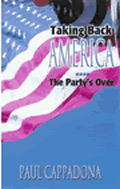Other
Eakman
Articles:
So, You Want to be an "Education" Candidate
The Resignation of a Schoolteacher
FLORIDA STATE LEGISLATORS STEP UP TO THE PLATE
By
Beverly Eakman
May 12, 2005
NewsWithViews.com
Two weeks ago today, I was asked to testify, as a former teacher, at a legislative hearing in Tallahassee, Florida, concerning two pivotal pieces of legislation, one in the House (primary co-sponsor: State Rep. Gus Barreiro) and one in the Senate (sponsored by Victor D. Crist). Both related to mandatory psychiatric referrals and psychotropic drugging of children as a condition of attending school. The bills were remarkably well-written, concise and to the point. They hinged on full disclosure notices to parents concerning the subjective nature of psychiatric labels listed in the ever-expanding bible of the profession (the Diagnostic and Statistical Manual of Mental Disorders, or DSM), and on the right of parents to refuse both psychiatric referral and/or psychotropic drugging of their children.
On the face of it, there didn�t seem to be anything to debate. Parents were being given credit for average intelligence -- enough to make a determination as to whether a mental health referral or psychotropic drug is appropriate, and full disclosure attesting to the lack of medical validity behind psychiatric labels (i.e., virtually none can be validated via a blood test, x-ray, chemical analysis, or other visible diagnostic measure), including a warning that DSM labels may result in adverse repercussions when a child applies to a college or for a job.
Many of those fighting these bills were, of course, themselves parents, yet the mental health and psychopharmaceutical lobbies were apoplectic, school officials were furious, and spokespersons for various school-related professional organizations seethed. Debate on the bills produced standing-room-only crowds.
And for good reason. After some 40 years of lousy teacher training, lax discipline, deteriorating academic focus, ineffective fads, and federal legislation aimed at mainstreaming belligerent juveniles in educational facilities, schools have become unmanageable. From a public school official�s, or even a teacher�s, perspective, about the only recourse left for getting miscreants and children who aren�t learning out of the room is to refer them to a mental health worker or drug them into submission.
The sticking point on the bills was �full disclosure,� with �right of refusal� running a close second. On the Senate side, one legislator refused to support the bill because, he said, it would leave an opening for the state�s Department of Children and Families (a typical child protective services agency which indirectly receives federal funding) to come in and charge a parent with �medical neglect� if he or she refused the recommendation of a psychotropic drug -- a �Catch-22� featuring your tax dollars at work. Another legislator complained that it would have a �chilling effect� on confidentiality between the school psychologists and the child.
How about the �chilling effect� on the family? Oh, well�
And we won�t even discuss the Individuals With Disabilities Act, which has morphed into a psychiatric �disabilities� behemoth that keeps unruly kids in the classroom instead of showing them the door so others can learn. Or the pending effort to screen the entire U.S. population through the schools, using the New Freedom Initiative and No Child Left Behind Act as the enabling vehicles.
Professionals from around the country were flown to Tallahassee, including a pediatric neurologist -- a frequent face at such hearings nationwide. He outlined the faulty science contained in the DSM. Like the other experts, he had three minutes to make his case. Afterward, he made an extraordinary observation to me worth repeating here: �You know, at hearings like these,� Dr. Fred A. Baughman said, �they might fly experts in from all over the world and avail themselves of some of the finest minds. But legislators increasingly find themselves debating literally dozens of unrelated bills in a single day. They are making truly momentous and life-altering decisions based on what amounts to a sound bite from people who have spent their entire lives researching and studying one issue.�
This time around was no different. Parents patiently awaited their turn, along with various experts and celebrities, while the legislators in both the House and Senate scrambled through a dizzying array of non-education-related bills, amendments, riders and briefings.
As I mentioned, I was the token classroom teacher -- a profession I once loved, but escaped after nine years to fairer fields as a technical editor, science writer, speechwriter, and finally author and head the National Education Consortium in the Washington, DC metropolitan area.
Where does one start defending a highly credible piece of legislation that would restore some measure of control to parents -- even when you know all about all the various �gotcha�s� at the state and federal levels that will inevitably tie the whole system up in knots?
After listening to all the experts, including parents whose children had been hurt or killed due to side-effects from psychotropic medications, I really didn�t know where to begin. So I started with myself.
I explained how I was a �natural� for teaching and for this debate, because I was once one of those quirky, pain-in-the-derri�re kids who drive their elders nuts. If the term �hyperactive� had been �in� in the 1950s, I�d have found my niche. My mom might even have been able to indulge in pursuits more satisfying than disciplining me, if she could just have found some justification that would explain away my behavior -- perhaps �a chemical imbalance in the brain�?
But � I was born too soon.
I was also born too soon to be labeled with a code out of the DSM. Happily, I had the luxury of altering my conduct the old-fashioned way. I didn�t have to worry about somebody accessing a computer file 20 years down the road and trudging up some label like Attention-Deficit-Hyperactivity Disorder or Oppositional Defiant Disorder. I never had to worry about losing out on a career choice, based on a DSM label I acquired in the 4th grade. I didn�t have to sit by and watch my mother being intimidated and railroaded with innuendos concerning what would various government agencies could do to us if she didn�t refer me to a psychiatrist or, worse, drug me for, well, behaving like a child.
What I didn�t have time to tell the legislators and packed forum was what I actually did in school that would have, no doubt, earned me a DSM label, and probably a drug cocktail, too. Like the cartoon character, Calvin, I fantasized glorious deeds and made myself the hero.
I guess the worst of the lot was �The Medical School.� The polio scare was all over the news in those days and a vaccine, hopefully, was on the way. Well, I had one of those Playskool doctor�s kits. I replaced the make-believe plastic syringe needles -- which looked kind of phony, I thought -- with Mother�s hatpins and threatened to inoculate the 3rd-graders with a mixture of Vicks Vaporub and salt water, until some spoilsport called my mother.
Then there was the classmate who handed me a pair of scissors and dared me to cut just a snip of her dress. Well, you can imagine who got in trouble for that one -- me, the �cutt-ee.� I fell for it. Now, if we�d just had school psychiatrists around, they would have written that I �failed to pick up on social cues,� which of course is associated with �mildly autistic behavior.�
But back then, we weren�t so �enlightened.� My mother never had to wonder what was going on, because she always got an unsolicited report at 4:30 p.m. Had I thrown my sandwich in the trash can again? Had I excused myself from study hall to giggle in the bathroom with my best friend? Worn lipstick to class? Well � it would all come out at 4:30 when she came to pick me up. That was the kind of �behavior modification� teachers and parents employed to keep us youngsters in line -- frequent interface between our parents and teachers -- not mind-altering drugs and encounter sessions.
We got in trouble for the small things, before they could escalate -- like for telling a classmate to �shut up.� Well, if we were going to get read the riot act for saying �shut up,� we sure weren�t going to be using the other four-letter �s�-word anytime soon! One 6th-grade teacher confiscated all the girls� purses because we were spending class time �showing off with them.� By the time I was teaching, however, that teacher could be fired for �disrespecting a pupil�s legitimate property without cause.�
But since I couldn�t cover such things in the time allotted, I explained instead to the legislators why I left the education field; how it really began during my four years of teacher training, when I discovered that school was no longer about �basics,� or literacy, or proficiency; that what school was about was �mental health.�
I produced a laundry list of courses I endured as a prospective teacher: education psychology, child psychology, adolescent psychology, and so on. I described how nobody cared whether I had a grasp of my chosen subject area.
The justification for emphasizing psychology, as I eventually understood it, was to produce happier, freer, more inquisitive minds: mentally healthy kids who would be less inclined toward conflict. We collegiates were encouraged to apply the same philosophy to parenthood, should that event occur sooner rather than later.
Well, at 19 years old all this seemed a flash of insight! It was a pivotal moment.
Even parents� magazines suddenly were filled with articles by child experts advising moms and pops to lay off the discipline and �moralizing,� to let kids express themselves and give children their �space.� Remember that? Don�t snoop around, they said. Remember, a child has a right to privacy, too.
�Oh, man!� I thought. To have been raised like that! Imagine what I could have done with my Vicks Vaporub-salt water concoction if my parents and teachers had just had a little better attitude!
How I wished I could have said that to the mental health lobbies at the Florida hearings! Here they all would have been, trying not to laugh, because they were going to have to get up and testify to the benefits of drugging �challenging� kids like me. If you are reading this, you know these folks would have had me labeled, on Ritalin, and in therapy faster than the FDA could recall Vioxx! I mean, a 4th-grader, for Heaven�s sakes, trotting around with a hatpin!
And my conduct wasn�t the only problem. Every time my mother got a report card -- which came in the mail, by the way, not in my devious little hands -- there was a note typed on the bottom that said �Beverly would do better if she paid more attention in class and did not daydream.� Aha! Proof positive of attention-deficit/hyperactivity disorder! A perfect candidate for Ritalin.
In my school, they graded us not merely on our subjects, like history and reading and arithmetic, but there was this whole other list of stuff like oral expression, and written expression, and abstract reasoning. I kept getting this big, fat �D� in oral expression. For the life of me I couldn�t figure out why I kept getting a �D� in oral expression, seeing as how I had so much to say, and how much I participated in class and all! Until one semester it was explained to me by my teacher that my mouth and my brain were out of synch! My mouth, you see, was two miles down the road but my brain was still in the garage. Now, if I could just get the two together, the problem with those D�s might get resolved.
Well, this was a blow to my already low self-esteem. I mean, I was already a poster-child for ego-challenged youth! I was so skinny that even my friends told me I looked like I had two pipe cleaners hanging down from my gym shorts, frizzy-hair, Coke-bottle-thick eyeglasses, zits, and, well, let�s just say my body gave new meaning to the term topless.
My mother, on the other hand, was this auburn-haired knockout, a former concert violinist and, later, vice-president of a bank. Not only that, she could fix an entire Thanksgiving dinner dressed in this long, green velvet hostess gown WITHOUT EVER DONNING AN APRON. Every year, I�d wait for some crafty cranberry to make an inauspicious detour onto the sleeves. But, every year, she�d put the dress back in the closet, completely unsoiled, and bring it out again at Christmas.
I was completely dumbfounded. And so was my mother, because she couldn�t figure out how she could possibly have produced such a klutz!
Well, that clinches the case for drugs! Obviously, I was �acting out� because of my low self-esteem and gifted mother, so you might as well add a little Prozac to my Ritalin cocktail, and first thing you know, I might have been slopping cranberry sauce all over Mother�s lovely dress, just for meanness, like some of the kids on psychotropic drugs today. Or, I might well have died as a result of drug interactions and side-effects, like so many other children whose names and photographs were presented at the Florida hearings.
Many parents may not remember it today, but it was educational psychologists, in the early 1970s, who came up with the bright idea of doing away with dress codes. That was also when school counselors stopped advising students academically and started �intervening,� as they called it -- looking for signs of supposed maladjustment in that DSM.
�We have endured one fiasco after another for 40 years in the name of �mental health�,� I told the legislators. �Let me ask you,� I said, �are your schools any the better for this intervention? Does this sound like a track record for more? We do indeed have kids today who are totally out-of-control, but it�s thanks to the advice an entire generation got about childrearing and teaching. We�re warehousing kids, not educating them!� I chastised.
Somewhere along the way, we lost out priorities. Good parents and serious teachers started being treated like well-intentioned dummies because they didn�t have advanced degrees in clinical psychology.
�We are teaching our children to approach their lives and their studies as a series of psychological calisthenics, while they flit from one activity to another. We don�t teach them to research and examine the meticulous deliberations of philosophers and great thinkers both modern and past. That�s why I left teaching,� I said.
�We need full disclosure,� I advised, �because young parents hear psychologists throw around terms like obsessive-compulsive disorder, attention-deficits, and hyperactivity and erroneously believe a medical test has shown their child to be sick. What kind of heartless parent is going to discipline a sick child?� I asked. �Parents stop right there, without ever thinking to seek medical confirmation through an MRI, CAT scan, or blood test. They don�t know these DSM markers are subjective, based on transient observations, or that the labels easily change -- one category, and then another. One drug on top of the next.�
You could have heard a pin drop in the crowded room.
The bottom line is that the mental �health� cartel has had its chance. Their �free-to-be� brainstorm didn�t work. Their �Schools Without Failure� plan didn�t succeed. Their admonitions against lecturing and moralizing flopped. And the killings at Columbine and now Red Lake, Minnesota, don�t sound like promotionals for their drugs, either. �Why should a kid have his brains turned into scrambled eggs, until he can�t tell what part of his personality is really him, and what part is �the drug�?� I asked.
Like the proverbial frog in the pot, parents and serious teachers, have been treated as �amateurs� -- well-intentioned dummies without graduate-level degrees in behavioral psychology -- and therefore supposedly unfit to make judgments concerning a child�s welfare or curriculum. On April 19, Florida State legislators got an opportunity to do the right thing, to codify parental consent and a full disclosure notices into law so that child �experts� can�t hide behind their bastardized version of �science� anymore.
The war, and even the battle, is far from over, but guess what?
Florida�s
legislators stepped up to the plate.
� 2005 Beverly Eakman - All Rights Reserved
Order
Beverly's book, Cloning
of the American Mind is out of print, supply is limited
Beverly Eakman is an Educator, 9 years: 1968-1974, 1979-1981. Specialties: English and Literature.
Science Editor, Technical Writer and Editor-in-Chief of official newspaper, National Aeronautics and Space Administration, 1974-1979. Technical piece, "David, the Bubble Baby," picked up by popular press and turned into a movie starring John Travolta.
Chief speech writer, National Council for Better Education, 1984-1986; for the late Chief Justice Warren E. Burger, Commission on the Bicentennial of the US Constitution, 1986-1987; for the Voice of America Director, 1987-1989; and for U.S. Department of Justice, Gerald R. Regier, 1991-1993.
Author: 3 books on education and data-trafficking
since 1991, including the internationally acclaimed Cloning
of the American Mind: Eradicating Morality Through Education. Executive
Director, National Education Consortium. Website: BeverlyE.com
E-Mail: deakman@erols.com
Somewhere along the way, we lost out priorities. Good parents and serious teachers started being treated like well-intentioned dummies because they didn�t have advanced degrees in clinical psychology.












